Molly’s Gone Fishin’- Tsuritama
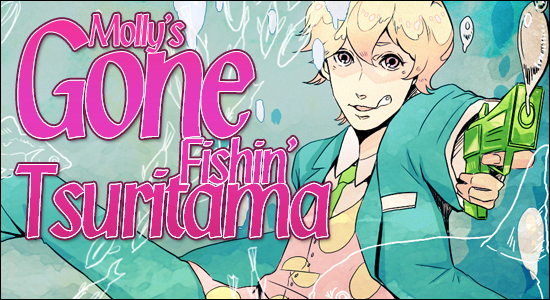
What do a quaint fishing town, aliens and ducks have in common? Gather your tackle because you’re about to find out in this Fishin’ Edition of Molly Rants-a-lot! Let’s dive in with Tsuritama!!
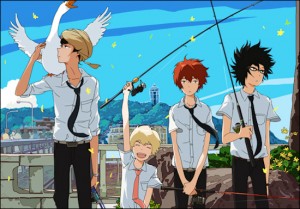
I’ll be the first to admit that I had no faith in this title. Besides a man in a turban holding a duck, the press image, made this series out to be another generic boy’s slice-of-life with a fishing element tacked on for the sake of being “different”. Oh, how quickly was I proven wrong. Sure, as slice-of-lifey as it was, Tsuritama explored adolescent interpersonal development with the core values born from the art of fishing. Now, I will say that as endearing as the context of the show was, it bore its fair share of “was that really necessary” moments. Nothing’s perfect, but we’ll return to this issue later. In the mean time, let us summarize the plot in a predictable fashion!
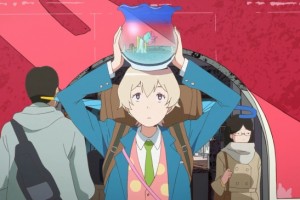
Tsuritama follows the journey of self change of Yuki who suffers from severe social ineptitude as a result of his frequent school transfers and long distance moves all on the whim of his guardian and grandmother, Kate (Keito). Upon his arrival in Enoshima, he is met with a strange transfer student, Haru, with a fishbowl balanced smartly on his cranium and a watergun with the ability to control minds. Oh and he claims to be an alien (on a mission to save Enoshima and the world) . Before he knows it, Yuki finds himself living with the strange boy, finding any way to cope with his new-found yet unwelcome new companion.
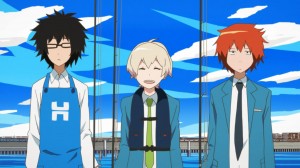
Enter Natsuki, the cool-headed “fishing prince” of Enoshima who is unwittingly convinced to teach Yuki and Haru how to fish and Akira Agarkar Yamada, a 25-year-old Indian who is on a mission to observe Haru through the secret alien protection agency “DUCK” along side his duck partner, Tapioca. In the months that follow, we see these boys (and duck) slowly develop an unwavering bond through the sport of fishing. Oh, I guess I should mention that it is up to Yuki (a first-timer behind the tackle) to save the world by catching an alien fish bent on controlling the world. With an island full of mind-controlled by-standers through a water-born endemic, our heroes must save the day from the… Enoshima dance of the apocalypse? Better bring a pancho.
The first half of this 12 episode series involves mastering daily fishing basics. While hesitant at first, Yuki soon finds himself taking to this otherwise mundane activity as a wonderful new hobby. With every new lesson Natsuki imparts on our hero, Yuki slowly learns valuable lessons that aid in his personal transformation. Patience, imagination, listening and quick intuition are only a few of the important values given to us through the show’s overarching message.
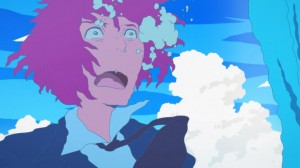
Personal development and maturity play major roles in the meat of the series’ context. Yuki begins a quiet, socially inept perpetual new kid in town. His phases of panic are illustrated through Yuki becoming paralyzed in fear, sporting a “demon-face”expression as a pool of water swells, engulfing his body as if to be “drowning” in the weight of his situation. The visual metaphor for what I could call “social stage fright” blends effortlessly with the theme as he is often pulled out of his drowning state by a tug on the fishing line. His time spent on the water allowed him to follow a very clear path of character development from mute and shut in, to soft-spoken and timid, to open, confident and fearless with a colorful array of steps in between.
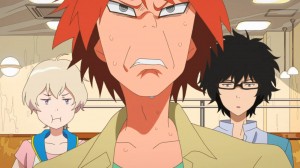
This idea is especially evident during Yuki’s time spent on a fishing boat. Unable to stand firm on deck, he bungles his first day. As he slowly gains confidence and with a sudden call to duty, he finds himself standing upright and ready, much to the surprise and delight of his now friends. From crawling to walking to running, this story presented us with a classic coming of age scenario as we watched this boy’s new self unfold. Yuki learns amidst the climax of the story that it is thanks to Haru, his annoying quarks and naive yet innocent outlook on life that Yuki saw this transformation within himself. Their friendship, while not your textbook human/alien relationship, reminded me that every interaction has the potential to change us in unexpected ways.
Haru was a cute, yet generic alien-based character. He had all the basic traits of a humanoid alien new to Earth: naive, innocent, unaware and happy as a clam. As flat as he may be, his time spent with Yuki was just as beneficial to him as it was for Yuki. Haru quickly learned the nuance of social interactions, the emotional implications of his words and that life is as fleeting as a flower (this was a reoccurring metaphor). Natsuki shared a similar development but in a very different way. Emotionally cold after the loss of his mother with only affection for fishing and his kid sister, he spends much of the series severing the emotional ties with his father and his girlfriend. The events of the plot and the presence of Yuki and Haru begins to soften him and allowed him to recognize very naive approach to coping with social and familial interactions. Just like Haru, he was being selfish.
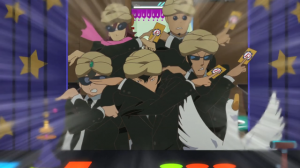
Now, here’s where I begin to nit-pick. Our Indian friend and posse of almost racially questionable curry-eating subordinates didn’t need to be. This element of “lol ducks so random” was entirely unnecessary. Upon inspecting the press-released shot of the main cast and after having gotton past episode one, my first assumption was that these boys would come to accept each other despite flaws, age and, in this case, race (alien, Indian or otherwise) and forge these bonds through their time spent fishing. Well, I was wrong. Akira became the flat-as-a-board x-factor character. While he slowly found himself developing an attachment to the three other boys, he was still a member of some extremist “department of alien defense” named DUCK for no real reason (or maybe there was a reason and I simply didn’t care enough to remember).
DUCK caused more issues than our alien friend and his alien sister. While in the end, they were almost commendable, I still could justify why we needed DUCK at all. Akira did see some character development near the end of the series as he went from impartial observer to stoic guide to our heroes, but it simply came much too late. Yuki changed, Haru learned a few lessons on the human heart and Natsuki softened up for his own family-related good. Akira, he manned the boat. Nice job, sir.
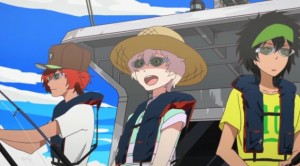
Up until the climax of the story this plot played out to be a very realistic approach to adolescent life and the all-too-relatable issues teens face whether they may be social awkwardness, parent loathing or fear of taking the next blind step. The comedic element was subtle and believable, making for an almost entirely easy-going experience. Pair that with the bright, tropical color-pallet and generic-busting stylistic elements that overshadow the all-too-generic character designs, we are left with a visual and heart-warming treat.
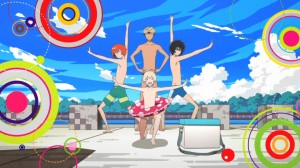
While I had my reservations about such a new series that received very little attention (though it did snag a licensing deal through Sentai Filmworks in North America), I was pleasantly surprised with my completely blind choice in titles. I’ll give it a B+ for story, B- for character design, and an A+ for delivery of message and interesting fishing factoids. This is certainly a must watch for the summer season. If you can’t go to the beach, let the beach come to you. See it all for yourself from beginning to end on Crunchyroll for free!
With this, I must bring this month to an end. Catch up with me next month in Rosemont, IL for Anime World Chicago and another dose of anime insights from the convention floor! Until then, I shall impart unto you a happy July and a safe Summer season.
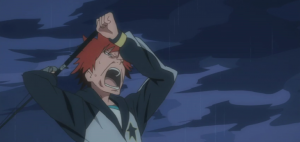
Eno-Shima-BOOOWWL



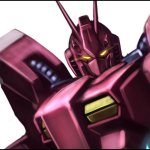
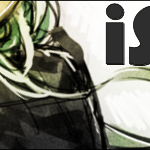

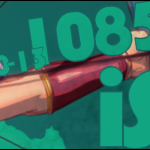



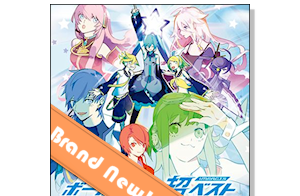





I’ve seen a lot of love for this on Tumblr. I think it might be a little too weird for me though…
Actually, the weird factor was pretty low-key. For all the silliness this show promotes through images and such, it has a nice calming air about it. However, I would agree this might not be your cup of tea (still doesn’t mean you shouldn’t give it a try ^^).
If I watched anime at a faster pace I might, but since it takes me two months to finish a single show this will be on the back-burner for awhile.
So would you say that this show is a real… catch?